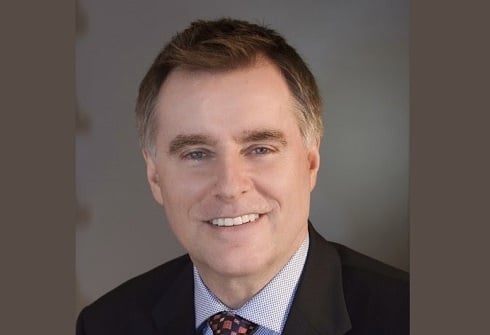Ask Michael Prittie about the secrets to his professional success, and he’ll tell you two things

Ask Michael Prittie what the secrets to his professional success have been, and he’ll tell you two things: the willingness to do what others aren’t willing to do, and a commitment to lifelong learning – all for the benefit of his clients.
It makes perfect sense, especially considering how he started in the financial services industry. “In 1985, I was keenly interested in the growing mutual fund and investment industry – but wasn’t in it,” said Prittie, portfolio manager and senior financial advisor at Mandeville Private Client - Capital Wealth Architects. “I took on the pre-requisite courses, interviewed and became licensed in September 1986.”
Because he’d been in Ottawa for a long time, he had a natural prospect base that he built into a successful book of business. Prittie helps clients by having meaningful conversations with them. “Early on I attended Dale Carnegie Training where I learned to ask questions,” he said. “A lot of the time questions are the answers, and I think many advisors miss out by talking too much. Effective communication is critical.”
His self-starting attitude took him through courses in real estate, taxation, and investment planning over the course of a few years. “I was a keen builder of knowledge,” Prittie said. “Basically, I took anything I could get my hands on, anything and everything to build my career … to be the best I could be for clients. I was keen to get my CFP credentials within the first few years of my career.”
His passion for the field was bolstered with education and credentials; currently, he holds designations including CFP, CIM, CPCA, FCSI, and CIWM. He became a manager in 1990, has won numerous awards for individual and team success, and is currently Mandeville’s vice president of insurance as well as chair of Mandeville’s Advisory Council. He continued to advance, “never losing sight of the fact that it’s clients we work for and ultimately clients who turn on the lights!”
Every day, Prittie said, he enjoys uncovering ways to create wealth for them. That requires going beyond basics. “You have to do deep planning and ongoing research. Look at all the ways to mitigate taxes through prudent tax planning, estate planning, insurance, and ways to manage risk-adjusted returns with unbiased solutions to achieve the desired end result – whatever it is. It must be a well-thought-out complete package linked to a written financial plan and investment policy statement.”
The first courses he took were a valuable foundation, but he was able to build on that further thanks to continued study and knowledgeable coaches. “I was fortunate to have some great mentors… accountants and other professionals…and especially Michael Lee Chin. I met Michael when I joined Berkshire securities in 2001, before it became Mandeville, and I’ve been learning from him ever since. He’s a great resource and a great supporter.”
“Currently I’m having ‘life boat drill’ conversations with clients,” he continued, referring to an exercise he learned from another long-time mentor, NY-based Nick Murray. “It’s always worth revisiting the peak-to-trough market declines as a reminder. You’ve got to ask clients if they’re comfortable being exposed to a pullback. If not, then it’s time to discuss a change to their current asset allocation strategy and how it effects objectives.”
Given the number of clients out there who are retired or approaching retirement, one would think that they’d remember the lessons from the downturns they’ve lived through — but that’s not always what happens. “People generally don’t think about where they were three, five or ten years ago, and how far they have advanced,” he said. “Many compare statement to statement, which isn’t good… but that’s why we’re here.”
Given the robustness in equity markets over the last few years, Prittie is rebalancing his client’s portfolios to take advantage of the growth and prepare for an eventual pullback. He’s doing that especially within registered accounts, which are non-taxable.
Prittie said he is able to handle his client’s accounts well because of his disciplined approach, love for the role and four dedicated team members. He believes, though, that there’s one other important ingredient for advisors to work effectively with clients, one he has practised for years:
“I think the most important thing is to create an unbiased attitude, approach, and environment to best create wealth for clients. That’s the greatest added value you can bring to the table,” he said. “Work with a dealer that doesn’t force you to buy a specific product or solution, allows fee-based accounts and access to privates and alternatives. Adopt an attitude that rewards the client first as opposed to you, and have a compensation structure that puts you and the client in the same corner. When you and the client have aligned interests, the assets grow exponentially and you both benefit.”
Related stories:
Meeting client expectations in challenged markets
How to play the long game in investments
It makes perfect sense, especially considering how he started in the financial services industry. “In 1985, I was keenly interested in the growing mutual fund and investment industry – but wasn’t in it,” said Prittie, portfolio manager and senior financial advisor at Mandeville Private Client - Capital Wealth Architects. “I took on the pre-requisite courses, interviewed and became licensed in September 1986.”
Because he’d been in Ottawa for a long time, he had a natural prospect base that he built into a successful book of business. Prittie helps clients by having meaningful conversations with them. “Early on I attended Dale Carnegie Training where I learned to ask questions,” he said. “A lot of the time questions are the answers, and I think many advisors miss out by talking too much. Effective communication is critical.”
His self-starting attitude took him through courses in real estate, taxation, and investment planning over the course of a few years. “I was a keen builder of knowledge,” Prittie said. “Basically, I took anything I could get my hands on, anything and everything to build my career … to be the best I could be for clients. I was keen to get my CFP credentials within the first few years of my career.”
His passion for the field was bolstered with education and credentials; currently, he holds designations including CFP, CIM, CPCA, FCSI, and CIWM. He became a manager in 1990, has won numerous awards for individual and team success, and is currently Mandeville’s vice president of insurance as well as chair of Mandeville’s Advisory Council. He continued to advance, “never losing sight of the fact that it’s clients we work for and ultimately clients who turn on the lights!”
Every day, Prittie said, he enjoys uncovering ways to create wealth for them. That requires going beyond basics. “You have to do deep planning and ongoing research. Look at all the ways to mitigate taxes through prudent tax planning, estate planning, insurance, and ways to manage risk-adjusted returns with unbiased solutions to achieve the desired end result – whatever it is. It must be a well-thought-out complete package linked to a written financial plan and investment policy statement.”
The first courses he took were a valuable foundation, but he was able to build on that further thanks to continued study and knowledgeable coaches. “I was fortunate to have some great mentors… accountants and other professionals…and especially Michael Lee Chin. I met Michael when I joined Berkshire securities in 2001, before it became Mandeville, and I’ve been learning from him ever since. He’s a great resource and a great supporter.”
“Currently I’m having ‘life boat drill’ conversations with clients,” he continued, referring to an exercise he learned from another long-time mentor, NY-based Nick Murray. “It’s always worth revisiting the peak-to-trough market declines as a reminder. You’ve got to ask clients if they’re comfortable being exposed to a pullback. If not, then it’s time to discuss a change to their current asset allocation strategy and how it effects objectives.”
Given the number of clients out there who are retired or approaching retirement, one would think that they’d remember the lessons from the downturns they’ve lived through — but that’s not always what happens. “People generally don’t think about where they were three, five or ten years ago, and how far they have advanced,” he said. “Many compare statement to statement, which isn’t good… but that’s why we’re here.”
Given the robustness in equity markets over the last few years, Prittie is rebalancing his client’s portfolios to take advantage of the growth and prepare for an eventual pullback. He’s doing that especially within registered accounts, which are non-taxable.
Prittie said he is able to handle his client’s accounts well because of his disciplined approach, love for the role and four dedicated team members. He believes, though, that there’s one other important ingredient for advisors to work effectively with clients, one he has practised for years:
“I think the most important thing is to create an unbiased attitude, approach, and environment to best create wealth for clients. That’s the greatest added value you can bring to the table,” he said. “Work with a dealer that doesn’t force you to buy a specific product or solution, allows fee-based accounts and access to privates and alternatives. Adopt an attitude that rewards the client first as opposed to you, and have a compensation structure that puts you and the client in the same corner. When you and the client have aligned interests, the assets grow exponentially and you both benefit.”
Related stories:
Meeting client expectations in challenged markets
How to play the long game in investments



